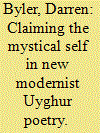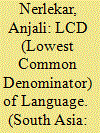| Srl | Item |
| 1 |
ID:
159371


|
|
|
|
|
| Summary/Abstract |
By recuperating the Sufi poetics of the Uyghur past, “avant-garde” Uyghur poets such as Tahir Hamut and Perhat Tursun are claiming a right to speak as heirs to both a religious and a literary tradition. For these modernist poets, finding one’s own way forward through the past is a way of reclaiming the discourse surrounding Uyghur identity, and the cultural symbols built into it, as an extension of the self. By channeling affect in such a way that it appears to derive from conventional Uyghur imagery, these poets demonstrate a measure of self-mastery that restores a feeling of existential security in the midst of political and religious change. This article argues that the purpose of their poems is to force the reader to accept new interpretations of images of Sufi embodiment and spirituality as valid and powerful. It further claims that the new indexing of Sufi imagery in this emerging corpus disrupts the unity of Uyghur poetry in the genres of Chinese Socialist Realism and ethno-nationalist Uyghur tradition, not in a negative process, but in order to create new forms of thought and subjectivity. It forces the reader to interpret the world not by trying to return to mythical Uyghur origins or reaching for a Socialist or an Islamic utopia but instead as a means of self-determination and affirming contemporary life itself.
|
|
|
|
|
|
|
|
|
|
|
|
|
|
|
|
| 2 |
ID:
175488


|
|
|
|
|
| Summary/Abstract |
The tumultuous politics of the post-Independence period in Bombay/Mumbai, and the creation of the linguistic states, released multiple and contradictory energies towards a re-examination of the Marathi language and its valence in linguistic, literary, social and cultural contexts. This essay employs the bilingual poetry of Arun Kolatkar and the Marathi-language poetry of R.K. Joshi to show the ways in which the sathottari poetry of Bombay engages with these socio-political questions of language and region by channelling the principles of concrete poetry and making the visual presence of the language (in its script, its lines, its presence on the page) a part of its meaning-making process.
|
|
|
|
|
|
|
|
|
|
|
|
|
|
|
|